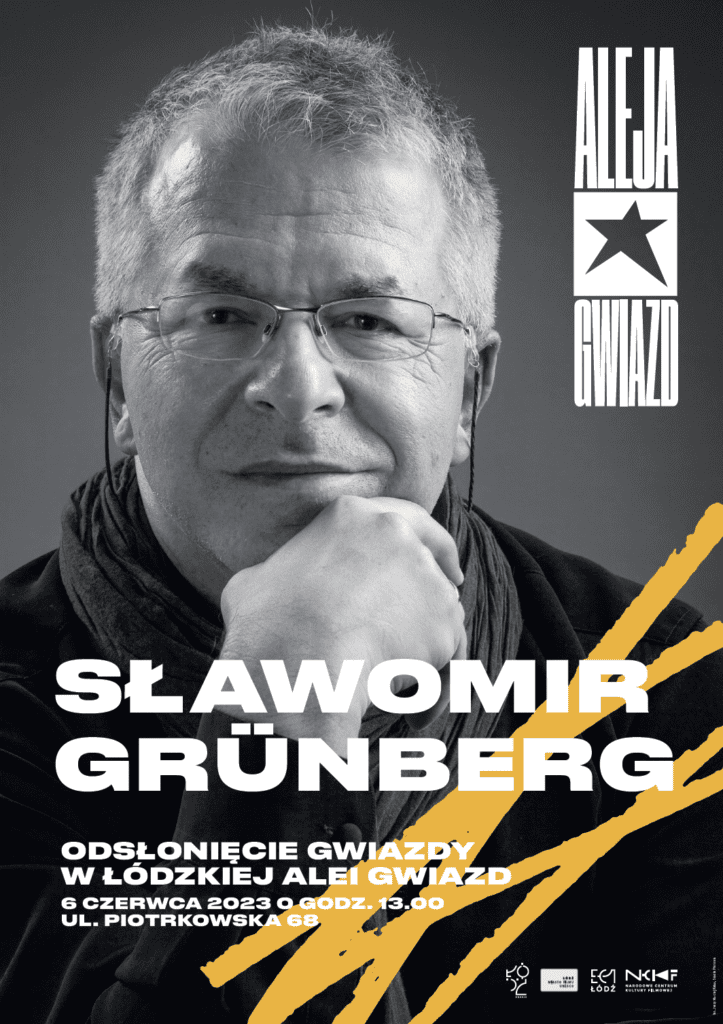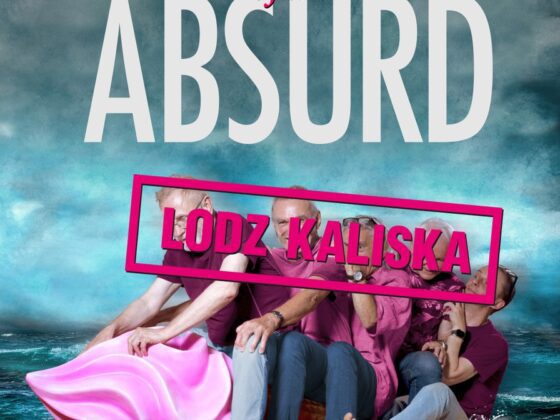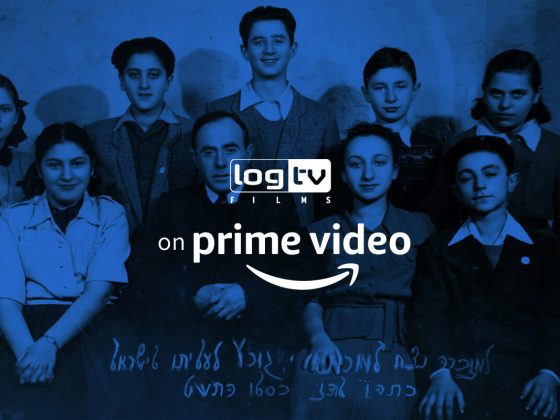

For English version, please scroll down
6 czerwca o godzinie 13.00 w Łódzkiej Alei Gwiazd przy ul. Piotrkowskiej 68 zostanie odsłonięta gwiazda Sławomira Grünberga, reżysera i operatora filmów dokumentalnych, producenta filmowego i telewizyjnego. Absolwent łódzkiej Szkoły Filmowej, zdobywca prestiżowej nagrody Emmy i autor zdjęć do filmów nominowanych do Oscara zostanie uhonorowany w Łodzi kilka dni po premierze swojego najnowszego dzieła „Łódź Kaliska: Klasycy absurdu”.
Sławomir Grünberg urodził się 6 kwietnia 1951 roku w Lublinie. Studiował… technologię drewna w Szkole Głównej Gospodarstwa Wiejskiego w Warszawie. Jest inżynierem. W 1976 roku dostał się na Wydział Operatorski, a po kolejnych dwóch – także na Wydział Reżyserii łódzkiej Szkoły Filmowej. Ukończył ją w 1981 roku, a 38 lat później zdobył jeszcze jeden dyplom – został doktorem sztuki filmowej na Wydziale Reżyserii Filmowej i Telewizyjnej.
W dorobku ma ponad 50 filmów dokumentalnych o tematyce społecznej, politycznej, ekologicznej, o problemach osób niepełnosprawnych, środowisk LGBT oraz o relacjach polsko-żydowskich. Zapewniły mu one krajowe i międzynarodowe uznanie oraz rozpoznawalność.
Pasmo sukcesów zaczęło się od „Niedzieli”. W 1979 roku wyreżyserował i zrobił zdjęcia do opowieści o ostatnim występie objazdowej grupy cyrkowej. Zestawienie tego wydarzenia w podpłockim Raciążu z leniwym, niedzielnym trybem życia miasteczka uznano za najlepszy film studencki na Krakowskim Festiwalu Filmowym. To jednak „Anna proletariuszka” wyjątkowo zaważyła na losie reżysera. Bohaterką półgodzinnej etiudy jest współzałożycielka „Solidarności” Anna Walentynowicz. Dokument powstał na przełomie 1980 i 1981 roku – był to film absolutoryjny Grünberga.
– Kiedy skończyliśmy film (razem z Markiem Ciecierskim), dostaliśmy propozycję pokazania go w Muzeum Sztuki Współczesnej w Nowym Jorku (MOMA) – wspomina Grünberg. – Przyleciałem do Stanów Zjednoczonych w listopadzie 1981 roku. Film miał być wysłany, ale nigdy to się nie stało. Został „aresztowany” na osiem lat.
Film trafił na półkę, a Sławomir Grünberg został w Stanach. Był wykładowcą na czterech amerykańskich uczelniach. Do tworzenia filmów wrócił po 1990 roku. Prestiżową nagrodę Emmy przyniósł mu dokument „School Prayer: A Community At War” („Modlitwa szkolna: społeczność w stanie wojny”). Grünberg opowiada historię matki sześciorga dzieci z Mississippi, która pozywa władze szkolne, domagając się usunięcia wspólnej modlitwy i lekcji biblijnych ze szkół publicznych. Społeczność chrześcijańska występuje przeciwko niej. Obie strony twierdzą, że bronią wolności religijnej. Recenzenci podkreślali odwagę w wyborze tematu i bezstronność autora w przedstawieniu złożonej sytuacji, która prowadzi do „przejmującej i przerażającej refleksji – jak religia może doprowadzić do zniszczenia społeczności”. Film ten wygrywał na wielu festiwalach, ale otrzymał też Nagrodę im. Jana Karskiego, którą honorowane są dokumenty „wykazujące się odwagą moralną”.
Aż pięć międzynarodowych nagród przyniósł Grünbergowi film dokumentalny „Fenceline: A Company Town Divided” z 2002 roku, wśród nich jest EMA (Enviromental Media Award). Z kolei film o Janie Karskim, pt.: „Karski i władcy ludzkości” został uhonorowany w 2016 roku m.in. nagrodą Ławra, czyli rosyjskiego Oskara w dziedzinie filmu dokumentalnego oraz Złotą Szablą na Międzynarodowym Festiwalu Filmów Historycznych i Wojskowych w Warszawie.
Sławomir Grünberg jest autorem zdjęć do filmów dokumentalnych nominowanych do Oscara – „Legacy” (2001) i „Sister Rose’s Passion” (2005). Jest laureatem Fundacji Guggenheima, New York Foundation for the Arts (NYFA) i Soros Justice Media Fellowships. Ma na koncie nagrodę DreamCatcher Award, prestiżowe wyróżnienie przyznane przez Festiwal Docboat 2009 dla międzynarodowej sławy dokumentalisty o polskich korzeniach oraz Złotego Glana od łódzkiego Kino Charlie, przyznawanego twórcom niezależnym przeciwstawiającym się modom i trendom dominującym w kulturze popularnej.
Tym, co wyróżnia Grünberga, jest stosowanie w filmach dokumentalnych kreatywnej animacji.
– Dekadę temu i oczywiście wcześniej tego rodzaju pomysły traktowane były jako eksperyment i najczęściej odrzucane. Sytuacja zmieniła się diametralnie w ostatnich latach, kiedy okazało się, że właściwie dobrana animacja może podnieść film dokumentalny na wyższy poziom percepcji. (…) Sławomir Grünberg, był pewien, że animacja będzie miała dodatkowe walory: łatwiej przemówi do młodzieży, podniesie atrakcyjność obrazu i przyswajalność informacji, które niesie film – napisała dr Anna Michalska, autorka recenzji książki Sławomira Grünberga „Animowany dokument, czyli efektywne formy łamania reguł w filmie dokumentalnym”.
Tak jest w „Karskim i władcach ludzkości”, w „Martwej naturze” i najnowszym dziele „Łódź Kaliska: klasycy absurdu” (premiera 29 maja 2023 roku na 63. Karkowskim Festiwalu Filmowym, zaś łódzka premiera obędzie się w dniu 6 czerwca 2023 roku). I wszystkie one związane są z Łodzią.
Fundatorem gwiazdy Sławomira Grünberga, 94. w Łódzkiej Alei Gwiazd, jest spółka Max Welt.
Po uroczystości zapraszamy na spotkanie ze Sławomirem Grünbergiem w Klubie 77 o godzinie 13.30.
English version:
June 6, 2023 at 1.00 p.m. in the Lodz Avenue of Stars at ul. Piotrkowska 68, Slawomir Grünberg – a film director and cinematographer, film and television producer will be honored with the 94th star on The Alley of Stars of the Lodz Walk of Fame (the idea borrowed from the Hollywood Walk of Fame). A graduate of the Łódź Film School, winner of the prestigious Emmy Award and cinematographer for Oscar-nominated films, he will be honored in Łódź a few days after the premiere of his latest work “Łódź Kaliska: Classic Artists of the Absurd”.
Sławomir Grünberg was born on April 6, 1951 in Lublin. He studied… wood technology at the Warsaw University of Life Sciences. He is an engineer. In 1976, he was admitted to the Cinematography Department, and after another two years – also to the Directing Department of the Lodz Film School. He graduated in 1981, and 38 years later he received another diploma – he became a doctor of film art at the Faculty of Film and Television Directing.
He has made over 50 documentaries on social, political and ecological topics, on the problems of people with disabilities, the LGBT community and on Polish-Jewish relations. They provided him with national and international recognition and recognition.
The string of successes began with ‘Niedziela’. In 1979, he directed and photographed a story about the last performance of a traveling circus group. The juxtaposition of this event in Raciąż near Płock with the lazy, Sunday lifestyle of the town was recognized as the best student film at the Krakow Film Festival. However, it was “Anna the Proletarian” that had an exceptional impact on the fate of the director. The heroine of the half-hour etude is the co-founder of “Solidarity” Anna Walentynowicz. The documentary was made at the turn of 1980 and 1981 – it was Grünberg’s graduation film.
“When we finished the film (together with Marek Ciecierski), we got an offer to show it at the Museum of Contemporary Art in New York (MOMA),” recalls Grünberg. – I came to the United States in November 1981. The video was supposed to be sent, but it never happened. He was “arrested” for eight years.
The film was shelved, and Sławomir Grünberg stayed in the States. He was a lecturer at four American universities. He returned to filmmaking after 1990. He won the prestigious Emmy Award for the documentary “School Prayer: A Community At War”. Grünberg tells the story of a Mississippi mother of six who is suing school authorities demanding that communal prayer and bible lessons be removed from public schools. The Christian community is against it. Both sides claim to defend religious freedom. Reviewers emphasized the courage in choosing the subject and the author’s impartiality in presenting a complex situation that leads to “a poignant and terrifying reflection – how religion can lead to the destruction of a community.” The film won at many festivals, but also received the Jan Karski Award, which honors documents “showing moral courage”.
Grünberg received as many as five international awards for the documentary “Fenceline: A Company Town Divided” from 2002, including the EMA (Enviromental Media Award). In turn, the film about Jan Karski entitled “Karski and the Lords of Humanity” was honored in 2016, among others with the the Lavra Award, i.e. the Russian Oscar in the field of documentary film, and the Golden Saber at the International Festival of Historical and Military Films in Warsaw.
Sławomir Grünberg is the cinematographer for Oscar-nominated documentaries Legacy (2001) and Sister Rose’s Passion (2005). He is a recipient of Guggenheim Foundation, New York Foundation for the Arts (NYFA) and Soros Justice Media Fellowships. He has won the DreamCatcher Award, a prestigious distinction awarded by the Docboat 2009 Festival for an internationally renowned documentary filmmaker with Polish roots, and the Golden Boot from the Charlie Cinema in Łódź, awarded to independent artists who oppose fashions and trends dominating popular culture.
What distinguishes Grünberg is the use of creative animation in his documentaries.
– A decade ago, and of course earlier, such ideas were treated as an experiment and most often rejected. The situation has changed dramatically in recent years, when it turned out that properly selected animation can raise a documentary to a higher level of perception. (…) Sławomir Grünberg was sure that the animation would have additional advantages: it would be easier to appeal to young people, it would make the image more attractive and the information contained in the film more easily digestible, wrote Dr. Anna Michalska, the author of the review of Sławomir Grünberg’s book “Animated documentary, or effective forms of breaking rules in a documentary.
This is how it is in “Karski and the Lords of Humanity”, in “Still Life” and the latest work “Łódź Kaliska: Classic Artists of the Absurd” (premiere on May 29, 2023 at the 63rd Karkowski Film Festival, and the premiere in Łódź will take place on June 6, 2023) . And they are all related to Lodz.
The founder of Sławomir Grünberg’s star, 94th on the Lodz Avenue of Stars, is the Max Welt company.
After the ceremony, we invite you to a meeting with Sławomir Grünberg at Klub 77 at 1.30 pm.
For further info:
Wojciech Kobylański
wojciech.kobylanski@ec1lodz.pl



